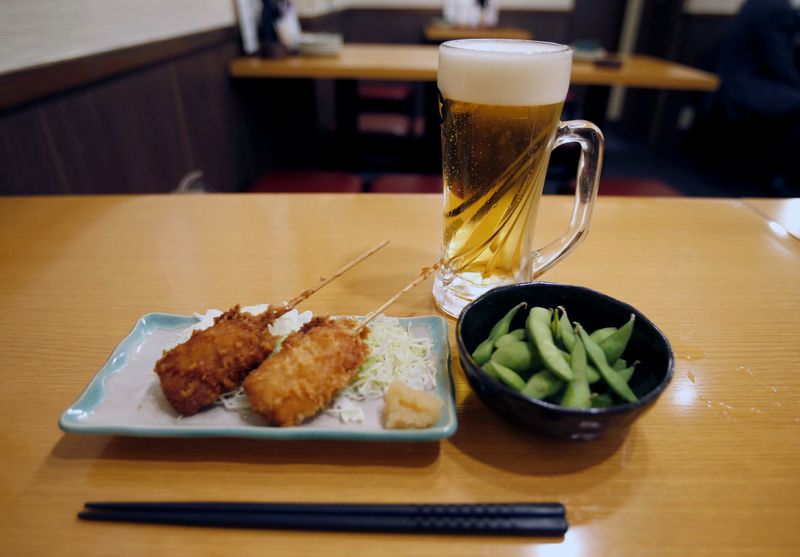By Leika Kihara and Kaori Kaneko
TOKYO (Reuters) - The widening economic fallout from the coronavirus outbreak and soft consumption are forcing the Bank of Japan to message more strongly that it is no longer inclined to chase its elusive 2% inflation target, sources familiar with its thinking say.
After years of trying to vanquish deflation by setting an ambitious price goal, Japan's waning recovery prospects and a dwindling policy tool-kit have made the BOJ more open to conceding that the best it can do is to keep the economy afloat, the sources said.
The need to protect the world's third-largest economy from a sharp downturn has became a more urgent task for the BOJ, particularly as external risks such the Sino-U.S. trade war and a coronavirus outbreak in China weaken its ability to create a virtuous growth cycle.
"While the inflation target remains very important, the focus of the BOJ's policy has shifted toward keeping the economy on a sustainable recovery path," one of the sources said.
The trade-reliant economy shrank at the fastest pace in six years in the December quarter on soft consumption. Some analysts see Japan tipping into recession as the coronavirus outbreak disrupts supply chains and hits tourism.
Making matters worse is the rising prices of goods and services, once welcomed by the BOJ as a sign of progress but now seen as impeding domestic consumption at a time of intensifying global pressures.
For one thing, the prices are being driven up by companies passing on higher labor and material costs to consumers, rather than an inflationary impulse reflecting improving demand. Anaemic demand has been a perennial problem in Japan and one that policymakers have tried, and largely failed, to address for decades.
The BOJ has already been watering down its 2% price target, after years of massive stimulus only succeeded in partially firing up inflation even when the economy was in good shape.
Now, as the economy slows and faces business disruptions from the coronavirus epidemic, central bank policymakers are shifting their attention further away from the price goal, the sources say.
Governor Haruhiko Kuroda and other BOJ executives no longer stress their readiness to ease further to achieve their price target. Instead, they say the bank will "patiently maintain" its current stimulus to fend off risks to Japan's recovery.
"We would need to consider monetary policy steps if (the virus outbreak) significantly affects Japan's economy," Kuroda told a newspaper interview.
PRICE HIKES A DRAG
Japan's economy ground to a halt in July-September last year as the U.S.-China trade war hurt exports. A sales tax hike took a toll on consumption the following quarter, dashing the BOJ's hope that robust domestic demand will offset the weakness in exports.
Household spending took a further hit as a growing number of firms raised prices in time with the tax hike to pass on rising labor costs to consumers.
Coca-Cola (NYSE:KO) Bottlers Japan Holdings Inc (T:2579) last year raised the price of its bottled soda drinks for the first time in 27 years, while Calbee Inc (T:2229) raised prices for some of its snacks and Nissin Food Products for its cup noodles.
Curry rice - a popular lunch dish in Japan - was also not spared with restaurant chain Ichibanya Co forced to pass on rising labor costs to its dish.
The impact of the price hikes on consumers, especially in a weakening economy where confidence is low and wage growth remains sluggish, has been telling.
Consumption sank 2.9% in the fourth quarter of last year, marking the first drop in five quarters.
Three-fifths of Japanese firms plan to keep overall compensation flat or even cut it in the coming business year, a Reuters poll found, underlining the challenge of boosting consumer spending and fostering sustainable economic growth.
"I want to order a set of cake and coffee at a cafe. But I only order a drink now," said 70-year-old Kaori Yamada, who spends less at coffee shops to save money.
Miki Suzuki, a 30-year-old who works in the service industry, says she would use on-line fleamarket apps to buy everything from clothes, cosmetics to soap.
"I buy vegetables at a place where farmers directly sell them because that's much cheaper than getting them at a supermarket."
The vulnerability of consumption to price hikes is forcing the BOJ to distance itself even further from its price target, the sources say. Annual core consumer inflation is currently running at 0.7%.
The central bank released research last year arguing that the optimal level of inflation could be lower than 2%, in another sign of the BOJ quietly backing away from its insistence on hitting the target.

"The BOJ's current approach is to underpin growth on hope that inflation will eventually pick up," a second source said.